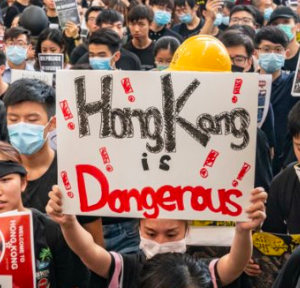For decades the city of Hong Kong has been considered one of the freest and most prosperous cities in the world. Due to its strong commitment to the rule of law, judicial independence, free trade and private property rights, Hong Kong has stood as a beacon in the region, attracting countless companies and trillions of dollars’ worth of investments.
These principles, however, are under significant threat. Hong Kong burns as 2 million residents — almost half the city’s population — take to the streets in response to actions by the Chinese Communist Party to destroy the goose that laid the golden egg, property rights.
While talking heads choose to focus on humanitarian issues, they neglect to mention the key role that property rights play in the protests. The truth is, Hong Kongers are fighting for their freedom to maintain their businesses, and freely interact with companies around the world.
The present crisis began when Hong Kong’s puppet government introduced an “Extradition Bill” allowing Chinese Communist Party authorities to extradite anyone from Hong Kong (including U.S. citizens visiting and residing there) to China, home to a dystopian legal system that acts simply to enforce “the will of The Party.” Most commentary so far has assumed that this has been to target political dissidents.
However, the law is actually designed to target corporations, extradite their executives, and use this power to subjugate them to the communist regime. China has readily jailed foreign company executives just to make a political point and has been known to give CEOs of major companies a “red phone” on which they receive edicts from CCP officials. That’s why, in the “People’s Republic,” a private company is only “private” on paper. With China receiving 70 percent of its total foreign direct investment through Hong Kong, Beijing clearly wants total control.
The Beijing regime has already gone to significant lengths to pressure Hong Kong-based companies, such as forcing the chairman of Cathay Pacific to resign for being insufficiently subservient. This “soft” pressure would increase a hundred-fold if executives were threatened with jail and re-education camps. The result would be the effective abolition of property rights in Hong Kong. Investment would quickly dry up. The rampant theft of intellectual property rights on mainland China is well-established, with at least 20 percent of major American companies having had their property stolen in the last year alone.
While Hong Kong Chief Executive Carrie Lam has promised that she will withdraw the bill, it is difficult to take such a promise seriously in the context of threats made by Chinese military officials. Protesters certainly aren’t buying Lam’s assurances, and in the absence of action on any of the other key demands of protest groups, unrest in the streets has not subsided.
Indeed, this appears to be little more than a transparent attempt to quell negative media in the leadup to the 70th Anniversary Celebrations of the Chinese Communist Party’s takeover of the mainland. China may also be hoping to avoid proposed sanctions being imposed by the U.S. Congress.
The human rights atrocities unfolding throughout China, where 2 million people languish in brutal concentration camps and organs are harvested from those killed there, should itself be a cause for significant alarm, and make it understandable why extradition to the mainland to suit the political desires of Beijing has generated such fury on the island.
However, to fully appreciate the full effect of what is occurring, one must understand the underlying economic motives of Beijing’s power grab. If China’s ploy succeeds, the resulting destruction of the rule of law and private property rights will irreversibly damage America’s economic interests as investors flee the region. For this reason, 47 organizations from 30 countries recently signed an open coalition letter demanding governments around the world take a strong stand in support of the protesters in Hong Kong.
Brandishing U.S. flags and proudly singing “The Star-Spangled Banner,” the Hong Kong protesters are fighting for the very values that we hold dear here in the United States: those of individual freedom, free markets and the rule of law. These values made Hong Kong free and prosperous and are key to continued growth and prosperity.
Even absent a moral duty to support the protesters, lawmakers in the United States should recognize the gargantuan economic toll that would result from inaction. For the sake of millions of Hong Kongers, the businesses undergirding the island’s prosperity, and the countless American companies that benefit from a free Hong Kong, the Trump administration and Congress must demand that China leave Hong Kong alone.

